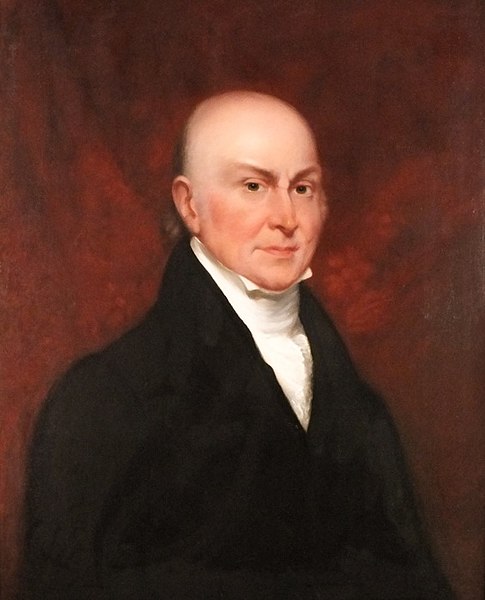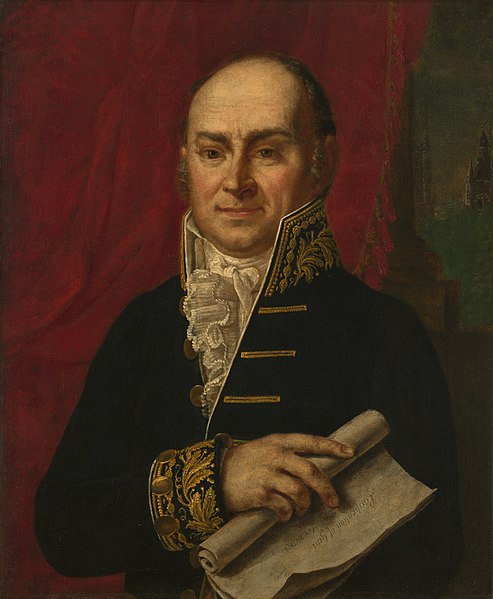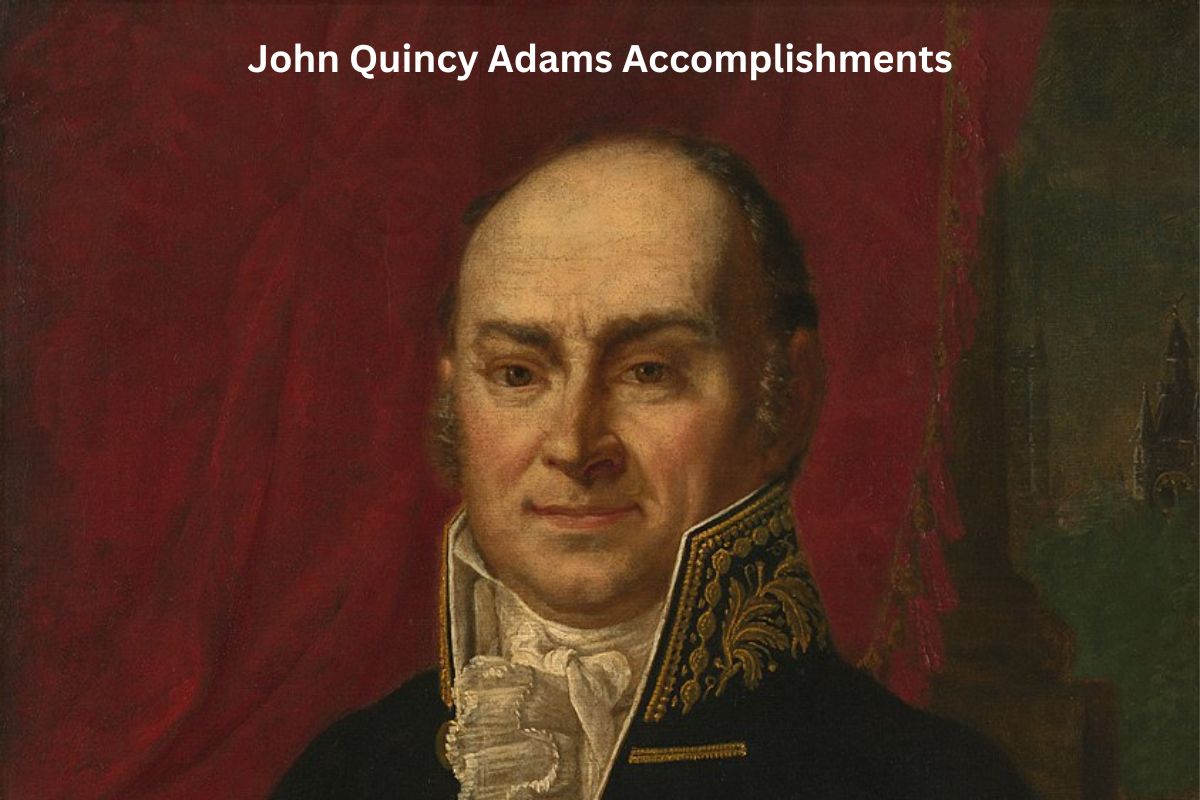John Quincy Adams, the sixth President of the United States (1825-1829), left an indelible mark on American history through his diverse accomplishments and unwavering commitment to public service.
From his diplomatic achievements and the formulation of the Monroe Doctrine to his role in acquiring Florida and his advocacy for infrastructure development, Adams played a pivotal role in shaping the nation’s foreign policy and territorial expansion.
His anti-slavery stance, dedication to education, prolific authorship, and influential post-presidential career in Congress further solidify his legacy as a statesman, diplomat, and advocate for civil liberties and justice in the early 19th century United States.
Accomplishments of John Quincy Adams
1. Diplomatic achievements
John Quincy Adams had a remarkable career as a diplomat before becoming President. Some of his notable diplomatic accomplishments include:
- Treaty of Ghent (1814): Adams played a crucial role in negotiating the Treaty of Ghent, which ended the War of 1812 between the United States and Great Britain. The treaty restored peace and established pre-war boundaries, ensuring that both nations resumed their pre-war territories and positions.
- Diplomacy in Europe: Adams served as a U.S. diplomat in various European countries, including the Netherlands, Prussia, Russia, and the United Kingdom. His diplomatic service helped strengthen American relations with these nations and contributed to the growth of U.S. influence in Europe.
- Negotiations with Spain: Adams was a key figure in the negotiation of the Adams-Onís Treaty in 1819. This treaty with Spain resulted in the United States acquiring Florida, settling boundary disputes, and establishing clear borders with Spanish-held territories.

2. Monroe Doctrine
As Secretary of State under President James Monroe, John Quincy Adams was a primary architect of the Monroe Doctrine, a cornerstone of American foreign policy.
Also Read: John Quincy Adams Timeline
The Monroe Doctrine was announced in 1823 and had two main principles:
- Non-Interference: The doctrine warned European powers against any further colonization or interference in the affairs of independent nations in the Americas. It aimed to prevent European intervention in newly emerging Latin American countries.
- Reciprocity: In return, the United States pledged not to interfere in the internal affairs or existing European colonies. It sought to establish a policy of reciprocity in which the Americas would be free from European interference.
3. Acquisition of Florida
John Quincy Adams played a pivotal role in negotiating the Adams-Onís Treaty, also known as the Transcontinental Treaty, with Spain in 1819.
Spain ceded Florida to the United States, settling territorial disputes and solidifying U.S. control over the region.
The treaty established the western boundary of the Louisiana Purchase, clarifying the border between the United States and Spanish-held territory.
The acquisition of Florida not only provided the U.S. with valuable land but also opened up new opportunities for economic development and settlement in the Southeastern United States.
4. Tariff of 1828
John Quincy Adams supported and signed into law the Tariff of 1828, although it was highly controversial and faced opposition, particularly from Southern states.
The tariff was designed to protect American industries from foreign competition by imposing high import duties on a wide range of goods. This was seen as beneficial for Northern manufacturing states.
Also Read: Abigail Adams Facts
Southern states, however, were largely agrarian and relied on importing manufactured goods. The high tariffs imposed by the 1828 law led to higher prices for imported goods and threatened the Southern economy.
The tariff exacerbated regional tensions between the North and the South, contributing to the growing divide over economic and political issues that would eventually lead to the American Civil War.

5. Infrastructure development
During his presidency, John Quincy Adams was a strong advocate for improving the nation’s infrastructure. Some of his contributions and initiatives in this area included:
- The American System: Adams supported the American System, which included a series of economic policies aimed at promoting economic growth and unity. This system included the development of transportation infrastructure, a national bank, and protective tariffs to encourage domestic manufacturing.
- Internal Improvements: Adams called for the construction of roads and canals to facilitate commerce and transportation. He believed that an interconnected network of infrastructure would help foster economic development and national cohesion.
- Cumberland Road: Adams signed a bill that funded the continuation of the National Road (Cumberland Road), a major infrastructure project that extended from Maryland to Illinois, providing a vital transportation link for settlers and goods.
6. Smithsonian Institution
One of John Quincy Adams’ lasting legacies is the establishment of the Smithsonian Institution, which remains an important institution in American culture and research.
Adams signed the bill into law in 1846 that established the Smithsonian Institution. The institution was created with the purpose of promoting and disseminating knowledge in various fields, including science, art, and history.
The Smithsonian houses an extensive collection of artifacts, specimens, and art. It has grown to include multiple museums and research facilities, making it one of the largest museum complexes in the world.
The Smithsonian continues to play a vital role in education and research, offering resources and opportunities for scholars, scientists, and the public to explore and learn about various aspects of American and global culture.
7. Anti-slavery stance
John Quincy Adams was a vocal opponent of slavery throughout his political career.
While serving in the U.S. House of Representatives after his presidency, Adams vehemently opposed the “gag rule,” which sought to prevent the discussion of anti-slavery petitions in Congress. He fought to defend the right of citizens to petition the government, even on the divisive issue of slavery.
Adams played a pivotal role in defending the right of enslaved individuals to petition for their freedom. His work on behalf of several enslaved petitioners brought national attention to the issue of slavery in the United States.
Adams’ dedication to the anti-slavery cause made him an inspiration to abolitionists. His commitment to justice and his willingness to challenge powerful pro-slavery interests helped pave the way for the broader anti-slavery movement in the United States.
8. Promoting education
John Quincy Adams was a strong advocate for education and believed in the importance of government-funded educational initiatives:
- National University Proposal: As President, Adams proposed the establishment of a national university, which he believed would promote advanced education, research, and intellectual growth in the United States.
- National Observatory: He also advocated for the creation of a national observatory to advance scientific research and education. While these proposals were not realized during his presidency, they reflected his commitment to education and research.
9. Authorship
John Quincy Adams was a prolific writer and author, and he made significant contributions to American literature and political thought
Perhaps his most enduring work is his extensive diary, which he maintained throughout his life. It provides valuable insights into his experiences, thoughts, and observations as a statesman and diplomat.
Adams authored numerous essays and writings on various topics, including government, politics, and foreign affairs. His writings continue to be studied for their intellectual depth and historical significance.
10. Post-presidential career in Congress
After his presidency, John Quincy Adams served as a member of the U.S. House of Representatives from Massachusetts for nearly two decades:
In Congress, he continued to champion civil liberties and was a strong advocate for free speech and the right to petition the government. He played a key role in opposing efforts to suppress anti-slavery petitions.
Adams used his position in Congress to advocate for justice and ethical governance. He was known for his passionate and eloquent speeches on issues ranging from slavery to foreign policy.
His long and dedicated service in the House of Representatives symbolized his unwavering commitment to public service and his deep sense of duty to his country.
